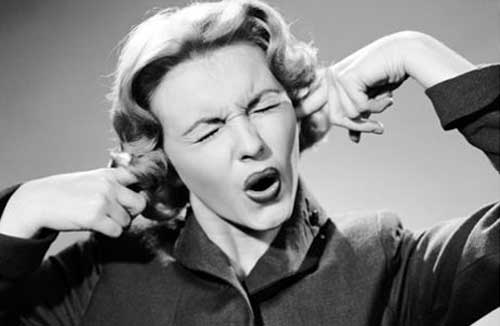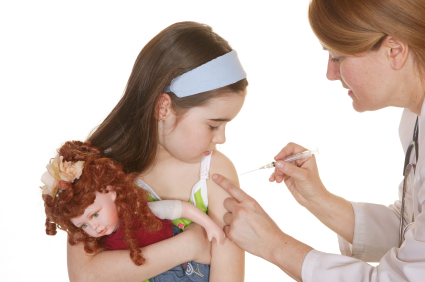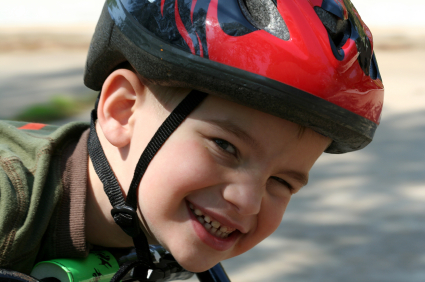Preventing Acquired Hearing Loss
Hearing loss isn’t always immediately evident at birth. When the condition arises later, it is called acquired hearing loss. Sometimes, the extent of the hearing loss will worsen over time, in which case it is referred to as progressive. Non-progressive hearing loss does not worsen over time.
Our interview this week with Lori Steed Sortino proves that it is indeed possible for a child to have a happy, fulfilled life with hearing loss. However, it can also be challenging. Amongst other issues, hearing loss can greatly affect the development of speech and language. Not all types of hearing loss can be prevented. But you can reduce the risk of acquired hearing loss by controlling the level of noise in your child’s environment, treating ear infections promptly, and reducing the risk of head injuries. See below for additional causes of acquired hearing loss.
Noise Control
We’ve all been to a rock concert or two in our day, and left the venue with ringing ears. Exposure to loud noises, particularly for a long period of time, can damage one’s hearing. Noises that are louder than 85 decibels (dB) can even cause permanent hearing loss. To put that number into perspective, a jackhammer emits 130 dB, a vacuum cleaner can emit 70 dB, and your hairdryer emits between 80 to 90 dB. In contrast, whispering is about 30 dB.
Since you’re unlikely to walk around with a noise dosimeter, a general rule of thumb is that if you have to raise your voice to be heard, the environment is too noisy. Try to steer your child away from noisy situations whenever possible. If that’s not possible, hearing protection like earplugs or earmuffs is the next best thing. If you choose earmuffs, make sure that they fit snugly. Have your child put on earmuffs if your family is going on an airplane, for example. Play music and movies at a low volume. Encourage your child to either ditch the headphones, or teach him about volume control. Select toys that do not emit loud noises. Encourage your child to use his “indoor voice” whenever possible. Many people have a tendency to talk louder on the phone. Tell your child that if the other person’s voice is very loud, he can hold the phone away from his ear.
Ear Infections
Ear infections are a common childhood malady, and they may also cause hearing loss. Also called acute otitis media, an ear infection occurs when the middle ear becomes inflamed. Otitis media with fluid means that the middle ear has a buildup of fluid. If the fluid remains in there for a long period of time, it increases the risk of hearing loss. Fluid in the ear can also cause short-term hearing loss, which typically resolves as the fluid drains.
If your child complains of ear pain, take him to the doctor promptly. Other signs of an ear infection are fever, problems sleeping, crying more than usual, pulling at the ear, or failing to respond to sounds. Most ear infections can be treated with antibiotics, however some children who experience frequent ear infections might require the surgical insertion of a tube to drain the fluid.
Other Infections
Other infections can also result in hearing loss, such as meningitis, chicken pox, the flu, mumps, measles, and encephalitis (swelling and inflammation of the brain). Talk to your child’s pediatrician about vaccinations to prevent infections. If your child exhibits any signs of illness, take him to the doctor promptly.
Medications
Many different medications can be toxic to the ear – these are called ototoxic drugs. They include aminoglycoside antibiotics, chemotherapy drugs, loop diuretics, and even pain relievers like aspirin. Unfortunately, if your child has a serious medical condition, you might have no choice but to continue the course of medication. Talk to your child’s pediatrician. Never abruptly stop giving your child a doctor-prescribed drug without consulting the doctor.
Head Injury
A traumatic brain injury (TBI) can cause tinnitus, which is ringing or buzzing in the ears, as well as hearing loss. This can occur when the tiny bones in the middle ear are damaged, or when the cochlea in the inner ear is fractured. If a head injury has already occurred and your child has suffered hearing loss, he might benefit from a hearing aid. Otherwise, reduce the risk of head injuries by using a child safety seat or booster seat and making sure that your child wears a helmet when bicycling. He should also wear a helmet when playing contact sports, skateboarding, sledding, riding a horse, or engaging in similar activities.





